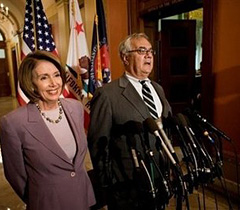
|  |  |  Business News | September 2008 Business News | September 2008  
Is a Deal Near on Wall Street Bailout?
 Virginie Montet - Agence France-Presse Virginie Montet - Agence France-Presse
go to original


| | "We have made great progress," said Nancy Pelosi (L), the speaker of the House of Representatives, echoing Paulson's assessment. "We have to get it committed to paper, so that we can complete, formally agree." | | |
US Treasury Secretary Henry Paulson and leading lawmakers early Sunday reported "great progress toward" reaching an unprecedented 700-billion-dollar Wall Street bailout plan before markets reopen, saying the accord would likely be finalized later in the day.

"We've been working very hard on this," Paulson told an early morning news conference. "And we've made great progress toward a deal, which will work and will be effective in the marketplace, and, you know, effective for all Americans."

But lawmakers taking part in the negotiations cautioned the deal still had to be "committed to paper," and congressional staff members worked through the night to finalize it.

"We have made great progress," said Nancy Pelosi, the speaker of the House of Representatives, echoing Paulson's assessment. "We have to get it committed to paper, so that we can complete, formally agree."

Senate Democratic Majority Leader Harry Reid said there had been what he called a "breakthrough," which he attributed to a last-minute intervention by Pelosi, and a formal announcement of the deal should be expected late Sunday.

But Senator Judd Gregg, a leading Republican negotiator on the issue, was more cautious, saying he will be looking at the final wording of the agreement Sunday and consulting with colleagues before giving his final approval.

"I think we are going to be able to have an announcement tomorrow, but these are difficult issues," he said.

Republican Representative Roy Blunt said he would have to take the proposal back to his caucus before committing his support for it.

However, White House spokesman Tony Fratto said President George W. Bush and his aides were "very pleased with the progress" made at the talks.

The New York Times reported the bill includes pay limits for executives whose firms seek help and requires the government to make more aggressive efforts to prevent home foreclosures.

In some cases, the government would receive an equity stake in companies that seek aid, the newspaper reported. The White House has also reportedly agreed to strict oversight of the program by a congressional panel.

US lawmakers have struggled to reach a deal on the 700-billion-dollar (479-billion-euro) original plan put forward more than a week ago by Paulson, who was criticized for failing to provide enough oversight.

The Paulson plan initially called for the government to use tax dollars to buy up bad loans, including mortgages, and hang onto them to provide greater liquidity for financial institutions.

But rebel Republicans instead drafted an alternative plan, calling for an expanded insurance system financed by banks to rescue individual home mortgages, so taxpayers do not have to fund the bailout.

The proposed bailout, first rushed to Capitol Hill by Paulson as a three-page proposal, has now ballooned into a document of more than 100 pages, CNN reported.

President George W. Bush sought to calm the wrath of many Americans who view the bailout as a huge handout for private companies while leaving ordinary people in the lurch. But he warned that there was no other way to redress the world's largest economy, and promised the final price tag would be less than 700 billion dollars.

"The failure of the financial system would mean financial hardship for many of you," Bush said in his weekly radio address, warning an increasing credit squeeze would make it hard for people to borrow money. "The result would be less economic growth and more American jobs lost. And that would put our economy on the path toward a deep and painful recession."

However, Democrats and Republicans have expressed disquiet that so much taxpayers' money would go to private companies, blamed by many for triggering the meltdown.

But Bush vowed in his weekly address that over time the value of the acquired assets would rise again.

With the world's largest economy in a tailspin, other governments are nervously watching the talks, concerned their economies could fall victim to any contagion.

International Monetary Fund chief Dominique Strauss-Kahn said in an interview published Sunday that the world body needed to tighten its control over financial markets.

The IMF was "ready to do what is required if we are given the mandate," he said, adding the world faced "financial anarchy" now as it did in 1944 when the IMF was set up in the aftermath of World War II.

"We can have national or regional authorities, such as the European Union for example, but we need a global guarantor, an institution which monitors standards," Strauss-Kahn told France's Le Journal du Dimanche. |

 |
|  |



